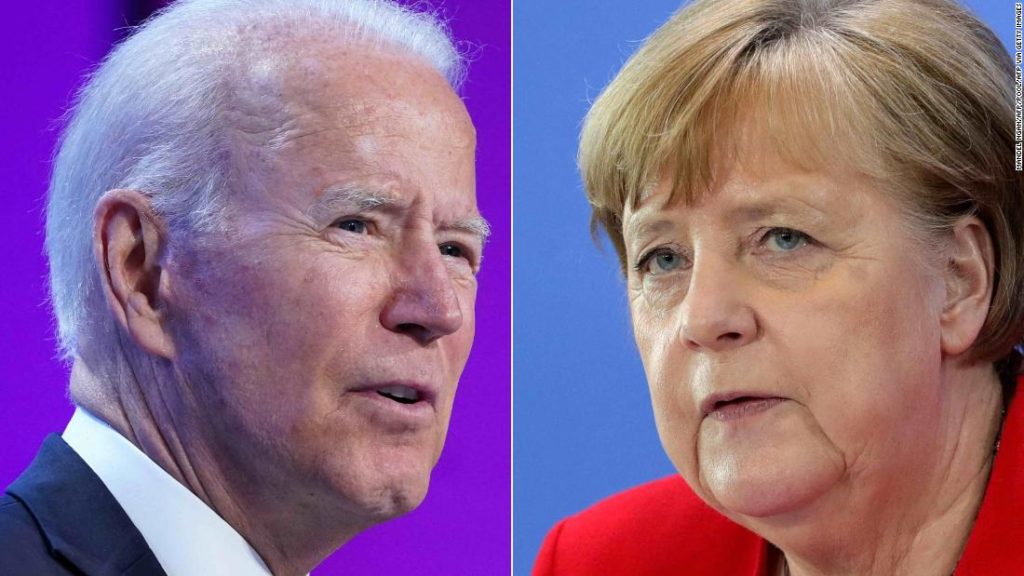The announcement is unlikely to end bitter divides over the pipeline, with US lawmakers condemning the agreement, Ukrainian officials immediately weighing in to say they are lodging diplomatic protests and even the US acknowledging their opposition to the project remains firm.
“I would just say emphatically that we still oppose Nord Stream 2, we still believe it’s a Russian geopolitical malign influence project, none of that has changed,” the senior official said.
In an attempt to prevent Russia from using the pipeline to increase European dependence on its energy supplies, Germany has agreed to take a series of measures meant to mitigate the risks to European energy security, to Ukraine, and to European Union and NATO countries close to Russian borders. In the past, Russia has cut off energy supplies to other countries, including Ukraine.
“Germany has really committed to taking swift action,” the senior official said in a call with reporters. “There are a number of tools that Germany and the EU have at their disposal to push back against Russian aggression or malign activities.”
‘Differences’
“We may have differences over Nord Stream 2, but we are united in pushing back against Russian aggression,” the senior official said.
“We don’t threaten our partners,” the senior State Department official said, adding that the administration engaged Ukraine on deliberations with Germany, and expects to work trilaterally with Ukraine.
Ukrainian officials immediately registered their disappointment and disapproval, with the country’s foreign minister taking to Twitter.
“Under art. 274 of the Ukraine-EU Association Agreement, Ukraine is officially initiating consultations with EU Commission & Germany on NS2, which threatens Ukraine’s security, violates the diversification principle of the EU Energy Union,” Dmytro Kuleba wrote. “Notes to Brussels & Berlin already sent.”
Lawmakers made their unhappiness clear as well. The leading Republican on the Senate Foreign Relations Committee, Sen. Jim Risch, said in a statement that “not a single member of Congress supports the completion of this pipeline.”
Sen. Jeanne Shaheen, the New Hampshire Democrat who has co-authored legislation to halt construction of Nord Stream 2, said the pipeline would empower Russian President Vladimir Putin and the Kremlin.
“Germany is a critical U.S. ally and I welcome steps by the administration to try to negotiate a diplomatic path forward and consult with our European allies to mitigate the impact of the Nord Stream 2 pipeline project,” Shaheen said in a statement. “However, I am not yet convinced that this agreement — or any bilateral agreement — can sufficiently provide assurances to our European allies and minimize the considerable economic impact and security implications of this pipeline’s completion. I’ve long contended that the Nord Stream 2 pipeline should not be completed because it empowers the Kremlin to spread its malign influence throughout Eastern Europe, threatens the economic security of our European partners and puts our global stability at risk. I continue to believe that.”
The senior official said that the pipeline is at this point more about 95% complete, but would not say when it may become operational, whether the Biden administration would lift existing sanctions or its threat to drop the sanctions waiver it issued in May for the company building the pipeline and its German CEO.
The senior State Department official repeatedly pointed out that the Trump administration chose to levy only two sanctions against the pipeline, and that it waited until its very last day in office to do so. The Biden administration has applied 19 sanctions to entities and vessels related to the pipeline.
“Even after Congress passed bipartisan legislation … in both 2017 and in 2019, the previous administration did not apply sanctions related to the pipeline until its very last day in office,” the senior official said. “The previous administration could have used a number of sanctions tools … but it chose not to.”
CNN’s Michael Conte and Kylie Atwood contributed to this report.
You may also like
-
Afghanistan: Civilian casualties hit record high amid US withdrawal, UN says
-
How Taiwan is trying to defend against a cyber ‘World War III’
-
Pandemic travel news this week: Quarantine escapes and airplane disguises
-
Why would anyone trust Brexit Britain again?
-
Black fungus: A second crisis is killing survivors of India’s worst Covid wave

